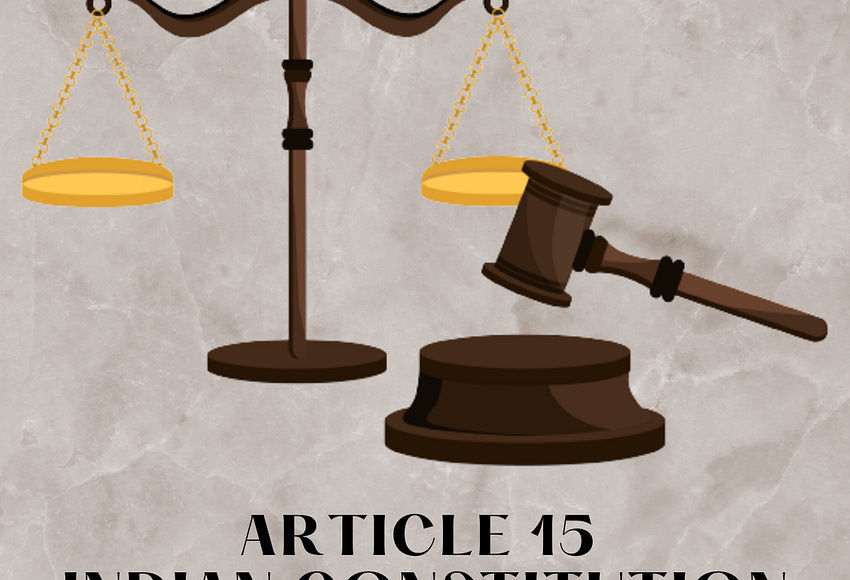
- June 12, 2023
- NGO Partner
- 0 Comments
- 613 Views
- 0 Likes
- Marketing Company Blogs
Article 15 of the Indian Constitution: Promoting Equality and Combating Discrimination
Article 15 of the Indian Constitution
Article 15 of the Indian Constitution stands as a powerful beacon of hope, illuminating the path towards a more equal and just society. It serves as a vital tool in the fight against discrimination, ensuring that every individual is treated with dignity and respect, regardless of their religion, race, caste, sex, or place of birth. With its profound significance in promoting equality and combating social prejudices, Article 15 holds a central position in the Indian Constitution.

The Indian Constitution, adopted on January 26, 1950, enshrines the fundamental rights and freedoms of every citizen. It serves as a steadfast guardian, protecting the rights and interests of Indian citizens from any form of oppression or discrimination. Rooted in the principles of justice, liberty, equality, and fraternity, the Indian Constitution serves as a guiding force, setting the stage for a harmonious and inclusive society.
Within this constitutional framework, Article 15 emerges as a beacon of hope, explicitly prohibiting any form of discrimination. It empowers individuals to challenge age-old prejudices and ensures that no one is denied equal opportunities based on their background. As we delve deeper into the provisions and impact of Article 15, we will witness its transformative power and its role in shaping a more equitable future for all.
Understanding Article 15: Promoting Equality and Eliminating Discrimination
Article 15 of the Indian Constitution stands as a powerful instrument in promoting equality and combating discrimination. Let’s explore its provisions and understand its significance in fostering a more inclusive society. Prohibition of Discrimination: Article 15(1) explicitly states that the State shall not discriminate against any citizen on grounds of religion, race, caste, sex, or place of birth. This provision serves as a shield, protecting individuals from the clutches of prejudice and ensuring equal treatment for all.
Objective of Equality: The objective of Article 15 is to promote equality and eliminate social inequalities. It recognizes that the diversity of our nation should be celebrated, not used as a basis for discrimination. By prohibiting discrimination, Article 15 aims to create a society where every individual has an equal opportunity to thrive, irrespective of their background.
Applicability to Various Spheres: Article 15(2) extends its reach beyond the State, encompassing educational institutions, public spaces, and public employment. It mandates that no individual should be denied access to these spaces based on their religion, race, caste, sex, or place of birth. This provision ensures that these spaces remain inclusive and open to all.
Exceptions and Safeguards: While Article 15 prohibits discrimination, it also provides certain exceptions and safeguards. Article 15(3) enables the State to make special provisions for women, children, and socially and educationally backward classes. These provisions aim to uplift and empower marginalized sections of society, ensuring their rights and well-being.
Upholding Social Justice: Article 15 is intricately linked to the broader concept of social justice enshrined in the Indian Constitution. It recognizes that achieving social justice is not possible without addressing discrimination and striving for equality. Article 15 serves as a foundation for building a just and inclusive society, where every citizen can live with dignity and respect.
In conclusion, Article 15 of the Indian Constitution plays a pivotal role in promoting equality and eliminating discrimination. Its provisions prohibit discrimination on various grounds and aim to foster a society that values inclusivity and equal opportunities. By understanding and upholding the principles enshrined in Article 15, we can collectively work towards building a society where everyone is treated with fairness and respect.
Significance and Impact of Article 15: Promoting Social Justice and Inclusivity
Article 15 of the Indian Constitution holds immense significance in promoting social justice, inclusivity, and empowering marginalized communities. Let’s delve into its impact and explore some landmark cases that have shaped its interpretation. Landmark Cases: Over the years, several landmark cases have strengthened the impact of Article 15. One such case is Indra Sawhney. Upholding Social Justice: Article 15 is a powerful tool in the pursuit of social justice. By prohibiting discrimination on grounds of religion, race, caste, sex, or place of birth, it ensures that individuals from marginalized communities are not subjected to unjust treatment. Article 15 recognizes the historical injustices faced by certain groups and seeks to level the playing field, enabling them to claim their rights and dignity.
Union of India (1992), commonly known as the Mandal Commission case. The judgment upheld the reservation policy for socially and educationally backward classes, affirming Article 15(4) which allows for special provisions. Such cases have played a crucial role in addressing historical disadvantages and promoting inclusivity.
Challenging Loopholes: Despite its significance, challenges persist in the effective implementation of Article 15. Discrimination and social inequalities continue to plague our society, often deeply entrenched in cultural and social norms. Intersectional discrimination, where individuals face discrimination based on multiple grounds, is also a pressing concern. These challenges highlight the need for continuous efforts to bridge gaps and ensure the comprehensive application of Article 15.
Strengthening Enforcement: To strengthen the enforcement of Article 15, reforms are necessary. Raising awareness about the rights guaranteed under Article 15 is crucial, ensuring that individuals know their entitlements and can exercise them. Moreover, there is a need for sensitization programs for law enforcement agencies and judicial officers to address biases and ensure fair and impartial implementation.
Education and Advocacy: Education plays a vital role in eradicating discrimination and promoting inclusivity. Efforts should be made to educate individuals about the importance of equality and the provisions of Article 15. NGOs, civil society organizations, and activists play a significant role in advocating for the rights protected under Article 15 and mobilizing support for its effective implementation.
In conclusion, Article 15 of the Indian Constitution holds immense importance in promoting equality and combating discrimination. Throughout this blog post, we have explored its provisions, significance, impact, challenges, and the way forward. Article 15 stands as a powerful tool in upholding the principles of equality and non-discrimination, aiming to create a just and inclusive society. It is our collective responsibility to understand and uphold the spirit of Article 15 in our personal and professional lives. Let us strive to challenge discriminatory practices, promote inclusivity, and work towards creating a society where every individual is treated with dignity and respect, regardless of their religion, race, caste, sex, or place of birth.




Leave a Comment